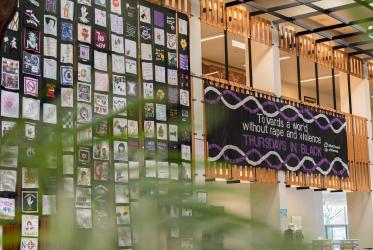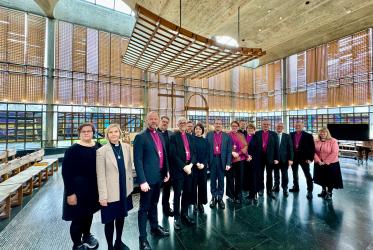Our series of interviews with Thursdays in Black ambassadors highlights those who are playing a vital role in increasing the impact of our collective call for a world without rape and violence.
Jouni Hemberg is executive director of Finn Church Aid.
What actions does Finn Church Aid consider most important to address gender-based violence?
Mr Hemberg: Finn Church Aid is the largest Finnish international aid organization. Our 2,200 staff members work in 15 countries all over the world. Finn Church Aid is particularly specialized working in the most fragile contexts and countries. For example, South Sudan, Somalia, Central African Republic, Myanmar, Eritrea, and also places like Kenya, less fragile countries. We are specialized in education in emergencies and humanitarian livelihoods assistance. In Cox’s Bazar, for example, together with DanChurchAid, we provide psycho-social support and education for women and adolescent girls who experience gender-based violence on their way from Myanmar to Cox’s Bazar, but still also in the camp. So our aim is to secure the young girls and women an access to quality education, offering them a safe place and a safe space to study and learn new skills, and that makes a remarkable change to their lives, and in their communities. We want to focus on these deeply-rooted harmful practices of gender-based violence in those camp environments.
How do you think "Thursdays in Black" is making a difference in Finn Church Aid’s work?
Mr Hemberg: International actors and human rights organizations have reported extreme cases of gender-based violence, especially targeting Rohingya women and girls. As in many other crisis areas, Women and girls of different ages continue to face different forms of gender-based violence. This is often true, especially in protracted crises or in humanitarian camp situations - in internally displaced person camps but also in refugee camps. Safeguarding of children and youth is very important but also keeping in mind the special groups such as disabled children or women is very important in humanitarian operations. The community-based psycho-social support we have been specializing in our education in emergencies, that work aims really to tackle these situations. We offer healing and also tools to recover from those past experiences they have faced. But we also advocate locally and raise awareness and information of the importance of working actively against different forms of violence against women, and we fight for equal rights for women and men.
The most important thing in addressing gender-based violence is in particular to recognize different modes of gender-based violence and make the whole thing visible so that the silence does not continue, and the victims get their voices heard, and that perpetrators will be recognized and convicted. We need to increase information among all and voice the right of all to a life in dignity and without fear.
As a Thursdays in Black ambassador, what message do you want to convey?
Mr Hemberg: By wearing black every Thursday, we can show our commitment to this campaign. We can message and respect the work of our colleagues and champions in our partner organizations, faith-based organizations, women and men of faith, interfaith partners as well as secular partners that we work with. They work in hard conditions every day and they work and fight against sexual and gender-based violence and rape. We will actively raise the campaign message and encourage our international staff to wear black on Thursday - every Thursday - to make the message more visible and heard. By this small signal, we can voice our message loud and join our hands with partners, more strongly on this important message: a world without gender-based violence and rape.
To learn more about Thursdays in Black ambassadors, please contact [email protected].
Video interview with Jouni Hemberg
Thursdays in Black Ambassadors
“Ambassadors” lead Thursdays in Black Solidarity (WCC Press release of 5 September 2019)







